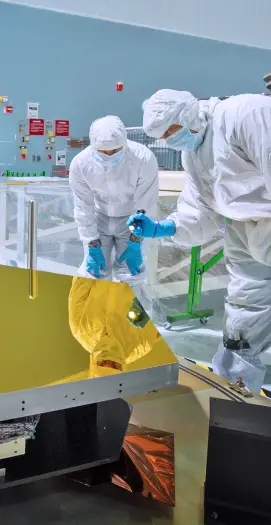Advice for Finding the Perfect Career
You’re about to graduate, and you’re eager to make your mark. How do you find that perfect job among a myriad of possible career paths? Below we’ve outlined some common methods of finding your perfect job in science.
Internship and co-op opportunities
Internships and co-op opportunities are a great way to ‘learn by doing’. During your final two years of school, you should be actively searching for these opportunities. Speak to your professors and your school’s career resource office to find something suitable. If you're able to land such a position and do a good job, you're likely to be offered a full time position with the company upon graduation.
Science Job/Career fairs:
Career fairs are a great way to interact with the recruiters of many organizations in a face-to-face setting. Be sure to ‘interview’ these employers by asking them why you should choose them, after all these organizations are just as eager to acquire strong talent as you are eager to find a great job. Be sure to bring multiple copies of your resume and engage with as many different companies as you can.
Your school’s career services/resources office:
The career services professionals in your school are paid to help you make career choices and introduce you to career information resources. Remember, they are not going to come find you; you need to take the initiative and approach them. These professionals can often identify career options that many undergraduate science students aren't aware of.
Networking:
Your personal and professional network should never be overlooked when considering your science career options and job prospects. The more people that are aware of your job search, the better your chances of finding suitable employment opportunities. Odds are someone in your network will know someone who is hiring, and they’ll be able to put in a good word for you.
Contact employers directly:
Identify common, and not so common, employers of science graduates. Then, visit the “careers” section of their websites to search for current opportunities. If they don’t have any listed that directly pertain to your desired field of work, then it may be worth your while to contact them directly and inquire about any unadvertised or upcoming opportunities that may be of interest to you.
By implementing some or all of these tactics in your job search, it won’t be long before you're a science graduate with multiple job offers, and plenty of options for starting your career.
Success Tip:
Be sure to keep a list of anyone you’ve spoken to, in any capacity, about a job. This includes employers you’ve met at career fairs, people you’ve contacted from your network, and anyone else with whom you’ve spoken directly about your job search. Make sure to periodically follow up with these individuals.
By implementing some or all of these tactics in your job search, it won’t be long before you're a science graduate with multiple job offers, and plenty of options for where to your career.
Science Career Planning Timeline
Below we’ve outlined a specific timeline of actions that will help you effectively make the transition from an undergraduate student to a professional in your chosen field. Remember, the more proactive you are with your career planning now, the more options you will have when you graduate.

First Year
- Create a resume, and if it seems short don't be concerned, as most first year science students won't have lengthy resumes at this point
- Introduce yourself to the career resource/services staff at your school
- Learn about yourself, your interests, and skills by utilizing online and printed resources
- Commit to a major by identifying the one that most relates to your interests and abilities
- Identify and pursue summer work and volunteer experiences that align with your major
- Ensure to maintain a strong GPA, as many employers will exclude students and recent graduates with low GPA's from internships and job opportunities
- Purchase a suit or an outfit that you can wear for interviews throughout the duration of your university career
Second Year
- Update your resume with any degree-related work experience you've obtained
- Join an on-campus science organization; this will help you network and develop interpersonal and communication skills
- Take several online career assessments
- Attend science-specific and general career exploration workshops, job fairs and other similar events
- Identify and contact scientific professionals to conduct an informal interview, they will give you great first hand information regarding a day in the life of someone with a career in science
- Research any available job shadowing or volunteer opportunities
- Plan early for summer work opportunities or internships
Third Year
- Pursue leadership opportunities in student organizations
- Update your resume to include all related work experience you've obtained during and after the second year of your science program
- Prepare for internship interviews by attending interview workshops
- Attend science-specific and general career fairs to research internships and future job opportunities
- Research graduate programs in science, and the schools that offer them
- Attend graduate career fairs to make contact with program representatives
- Finalize summer experience/internship plans
Fourth Year
- Seek and attend employment skill-building workshops
- Finalize your resume and cover letters to reflect all of the science-related work experience you have gained, as well as your education
- Sign up for mock interviews with your career resources/services staff
- Attend science-specific and general career fairs in the geographical location you plan to live (if possible)
- Apply to graduate school programs if you plan on attending
- Research potential employers and job possibilities
- Pursue any networking contacts through friends, family, clubs, professors, etc.
- If you have had successful co-op or internship experiences, you may already have one or more full-time job offers from employers with whom you have already worked
Science Scholarships
The sad truth is that literally millions of dollars in scholarship money goes unused every single year in North America! And it's simply because they're aren't enough applicants. You can help solve this over-funding crisis by getting some of this money.
Visit our Scholarships page to find scholarships, awards and bursaries related to your field of study, as well as those open to all students, regardless of field of study.
Find scholarships >










